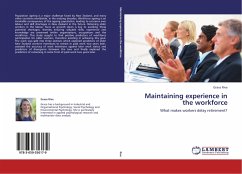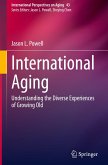Population ageing is a major challenge faced by New Zealand, and many other countries worldwide, in the ensuing decades. Workforce ageing is an inevitable consequence of the ageing population, leading to concerns over labour and skill shortages in New Zealand in the future. Retaining older workers in the labour force as growth slows is key to avoiding these potential shortages, thereby ensuring valuable skills, experience and knowledge are preserved within organisations, occupations and the workforce. This study sought to find positive predictors of workforce participation for older workers, therefore assisting in achieving this goal. The work was split into three sections which explored predictors of older New Zealand workers' intentions to remain in paid work two years later, assessed the accuracy of work intentions against later work status and predictors of divergence between the two and finally explored the predictors of remaining in some form of paid work two years later.
Bitte wählen Sie Ihr Anliegen aus.
Rechnungen
Retourenschein anfordern
Bestellstatus
Storno








